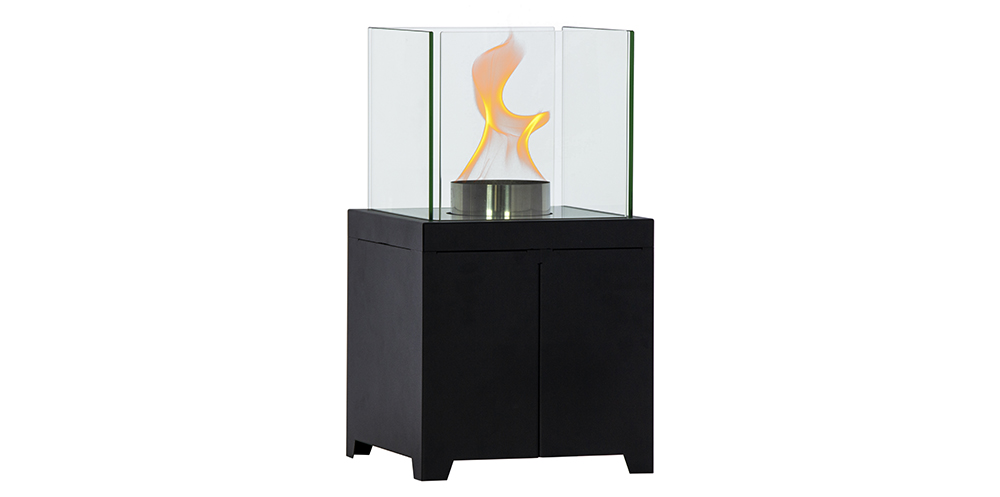Transforming your outdoor dining or lounging experience into a warm and cozy affair has never been easier, thanks to the innovation of wood pellet patio heaters on tables. These compact and stylish devices combine the charm of a tabletop with the efficient heating capabilities of wood pellet technology.

GB-WARM | Tabletop Pellet Patio Heater - BPH-Q
Embracing the Charm of Wood Pellet Patio Heaters on Tables
1. Efficient Heating
Wood pellet patio heaters on tables offer efficient and effective heating for your outdoor gatherings. These heaters utilize wood pellets as fuel, which burn cleanly and produce a consistent heat output to keep you warm and comfortable.
2. Space-Saving Design
The integration of the heater into a tabletop design maximizes space utilization. This compact design allows you to enjoy the warmth while also having a functional surface for drinks, snacks, or meals.
3. Aesthetic Appeal
These heaters come in various designs, allowing you to choose a style that complements your outdoor decor. Whether you prefer a modern, minimalist look or a rustic aesthetic, you can find a wood pellet patio heater that suits your taste.
4. Clean and Eco-Friendly
Wood pellets are a renewable and eco-friendly fuel source, making them an environmentally-conscious choice for outdoor heating. The combustion process produces minimal ash and emissions, contributing to a cleaner outdoor environment.
Benefits of Incorporating a Wood Pellet Patio Heater on Table
1. Extended Outdoor Season
With a wood pellet patio heater on a table, you can extend the usability of your outdoor space well into the colder months. This allows you to enjoy outdoor gatherings, meals, and relaxation even when the temperature drops.
2. Ambiance and Comfort
The gentle warmth emitted by these heaters creates a cozy and inviting ambiance, enhancing the overall comfort of your outdoor setting. Whether it's a romantic dinner or a casual get-together, the added warmth adds a touch of luxury to your experience.
3. Convenience and Versatility
Wood pellet patio heaters on tables are versatile additions that cater to various outdoor activities. From intimate dinners to game nights with friends, these heaters ensure everyone stays warm and content.
4. Reduced Energy Costs
Compared to traditional outdoor heating methods that rely on electricity or gas, wood pellet heaters offer a more cost-effective solution. Wood pellets are generally more affordable than other fuel options, helping you save on energy expenses.
Choosing the Right Wood Pellet Patio Heater on Table
1. Size and Heating Capacity
Consider the size of your outdoor space and the number of people you usually entertain. Choose a wood pellet patio heater with an appropriate heating capacity to ensure everyone stays comfortable.
2. Design and Aesthetic Compatibility
Select a heater design that complements your outdoor decor and style preferences. Whether you want your heater to blend in or stand out as a focal point, there's a wide range of design options available.
3. Ease of Maintenance
Look for models that offer easy access to the combustion chamber and ash collection system for hassle-free maintenance.
A wood pellet patio heater on a table not only provides practical heating but also enhances the ambiance and allure of your outdoor space. With their efficient operation, space-saving design, and eco-friendly attributes, these heaters are a valuable addition that allows you to enjoy your outdoor haven regardless of the weather.
FAQs
Q: Can I use regular firewood in a wood pellet patio heater?
A: No, wood pellet patio heaters are specifically designed to burn wood pellets, which are compressed and uniform in size. Using ordinary firewood can damage the heater and affect its efficiency.
Q: Are wood pellets readily available?
A: Yes, wood pellets are commonly available at home improvement stores, garden centers, and online retailers.
Q: Do these heaters require power?
A: No, the GB-WARM Tabletop Pellet Patio Heater does not require electricity.
Q: Are wood pellet heaters safe for residential use?
A: Yes, wood pellet patio heaters are safe for residential use. They are designed with safety features to ensure proper operation.
Q: Can wood pellet heaters be used on windy days?
A: While wood pellet heaters can be run on windy days, it's important to make sure the wind doesn't blow flames or embers around that could start a fire.
Q: Does a patio heater with pellets emit smoke?
A: Pellet patio heaters usually produce minimal smoke compared to traditional wood-burning heaters. The combustion process in pellet heaters is designed to be efficient, producing fewer emissions.
Q: Does an outdoor pellet stove also cause CO poisoning?
A: Pellet stoves, including outdoor ones, can produce carbon monoxide (CO) if not properly ventilated or maintained. Proper installation, regular maintenance, and ensuring proper ventilation are crucial to prevent CO buildup.
Q: Are there any disadvantages to a patio heater with pellets?
A: Disadvantages of pellet patio heaters may include the need to purchase and store pellets, maintenance requirements, and initial setup costs. Additionally, they might not provide as much instantaneous heat as some other types of patio heaters.
Q: How much can you save with a pellet patio heater?
A: The savings depend on factors like the cost of pellets, the efficiency of the heater, and the cost of alternative heating methods. Pellet heaters can be cost-effective compared to propane or electric heaters, but the exact savings will vary.
Q: Can you use a pellet patio heater indoors?
A: Pellet patio heaters are designed for outdoor use due to their ventilation and safety requirements. Using them indoors can lead to inadequate ventilation, increased risk of CO buildup, and potential fire hazards.
Q: Are wood pellets better for heat than propane?
A: Wood pellets can provide efficient and cost-effective heat, especially in pellet stoves designed for indoor use. Propane offers more instantaneous heat and is often used in outdoor heaters, but the choice depends on factors like convenience, cost, and your specific heating needs.
Q: How do you light a pellet patio heater?
A: Pellet patio heaters usually have automatic ignition systems. You load wood pellets into the hopper, set the desired temperature, and the heater's mechanism ignites the pellets and controls the combustion process.
Q: Do pellet patio heaters work?
A: Yes, pellet patio heaters are designed to work efficiently and provide heat for outdoor spaces. They use wood pellets as fuel, and many models are equipped with features like adjustable heat settings and automatic ignition.
Q: Are wood pellet heaters safe?
A: Wood pellet heaters are generally safe when properly installed and maintained. However, like any heating appliance, they require adherence to safety guidelines, regular cleaning, and proper ventilation to prevent issues like CO buildup.
Q: Can you burn wood pellets indoors?
A: Wood pellets can be burned indoors in a pellet stove designed for indoor use. These stoves are equipped with safety features and proper ventilation to ensure the safe combustion of pellets and the prevention of CO buildup.
Q: Are wood pellets cheaper than electric heat?
A: Wood pellets can often be cheaper than electric heat, depending on local fuel and electricity prices. However, the upfront costs of a pellet stove and the hassle of pellet storage and maintenance should also be considered.
Q: Which is cheaper, pellet or propane?
A: Pellet heaters can be more cost-effective in the long run compared to propane heaters. The exact cost comparison depends on pellet and propane prices in your area and the efficiency of the appliances.
Q: How efficient is a wood pellet heater?
A: Wood pellet heaters are known for their efficiency. They can achieve high combustion efficiency and produce consistent heat. The efficiency varies by model, but many pellet stoves have high efficiency ratings.
Q: Is it cheaper to burn wood or pellets?
A: Burning pellets in a high-efficiency pellet stove is often more cost-effective than burning traditional wood in terms of consistent heat output and ease of use. However, the actual cost comparison depends on local fuel prices and the efficiency of the heating systems.
Q: What are the disadvantages of wood pellets?
A: Disadvantages of wood pellets include the need for storage space, potential availability issues, and the requirement for electricity to operate pellet stoves. Additionally, pellet stoves might require more maintenance than other heating methods.
Q: Why do wood pellets give off carbon monoxide?
A: Incomplete combustion of wood pellets can lead to the production of carbon monoxide. This is why proper ventilation, regular maintenance, and appropriate pellet stove operation are crucial to prevent the buildup of CO.
Q: How long does pellet wood last?
A: The duration a bag of wood pellets lasts depends on the heat output setting of the stove or heater and the pellet consumption rate. Generally, a 40lb bag of pellets can last anywhere from a few hours to a day or more, depending on the heating needs.
Q: Is it OK to leave a pellet stove on overnight?
A: Many modern pellet stoves are designed to be safe for overnight operation. However, it's important to follow the manufacturer's guidelines, ensure proper ventilation, and have functioning CO detectors in the home.
Q: What is the difference between a pellet heater and a wood heater?
A: A pellet heater burns compressed wood pellets, which are a standardized fuel source. A wood heater burns traditional firewood logs. Pellet heaters often offer more efficient and controlled combustion, while wood heaters might require more manual attention.
Q: How long does a 40lb bag of wood pellets last in a pellet stove?
A: The burn time of a 40lb bag of wood pellets in a pellet stove varies depending on the stove's heat output settings. It can last anywhere from several hours to a day or more.
Q: How long do wood pellets last for heating?
A: The duration wood pellets last for heating depends on factors like the size of the stove's hopper, the heat output setting, and the efficiency of the stove. Generally, a wood pellet stove can operate for 24 hours or more on a full hopper of pellets at lower heat settings.
English
Español
العربية
Français
Русский
Português
Deutsch
italiano
Nederlands
Polski
Türkçe
日本語
한국어
ဗမာစာ
தமிழ்
Bahasa Indonesia
Čeština
қазақ
Српски
فارسی
Slovenčina
Slovenščina
Norsk
Svenska
Ελληνικά
Suomi
Latine
Dansk
Shqip
বাংলা
Hrvatski
Gaeilge
Eesti keel
සිංහල
नेपाली
Oʻzbekcha
latviešu
Български
ქართული
ગુજરાતી
íslenska
ಕನ್ನಡ
Lietuvių
Lëtzebuergesch
മലയാളം
Malti
मराठी
ଓଡ଼ିଆ
پښتو
ਪੰਜਾਬੀ
తెలుగు
isiZulu














